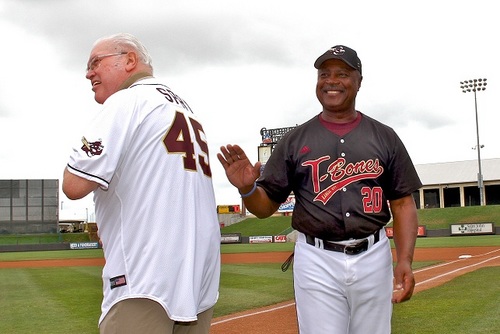
Frank White presented Lou Spry with a T-Bones jersey with No. 45 before Sunday's game. The 45 represents the number of years Spry was involved with the NCAA College World Series. (Photo by Matthew Hicks.)
-
By CHRIS SOURK
tbonesbaseball.com
When Louis Spry went to a semipro baseball game in Tacoma, Wash., as an 11-year-old, he had no idea that would launch a career as a scorekeeper and the Chief Financial Officer (CFO) in the NCAA.
Before announcing his retirement this summer, Spry was involved with the NCAA College World Series for 45 years, the last 32 of which were as the official scorer. He’s scored games for the American League and has been scoring T-Bones games since 2004, the club’s second season in Kansas City.
It all started for Spry that day in Tacoma when he and his father decided to go enjoy a baseball game together.
“My dad took me to a game one day, probably cost us a quarter to get in,” Spry said. “I whined until he bought me a scorecard, which was probably a nickel.
“As I’m sitting in the stands, I’m making marks on this card. This man sitting next to me said, ‘Do you know what you’re doing?’ I told him I didn’t. He taught me a very simple system that I have used for several years.”
From a simple beginning, Spry has been an official scorekeeper for 60 years. With his incredible amount of experience, Spry has been generous enough to pass on his knowledge of scoring by teaching a class to anyone that is interested.
“I teach what I call ‘watching more and writing less.’ It doesn’t give you a lot of detail but it’s very simple. From that I’ve began to enhance that system and I’ve taught other people to enhance that system,” said Spry.
When you’ve seen as many baseball games as Spry has, you can witness some wild things on the baseball field. However, when it comes to memorable plays, the play known as “the grand illusion” stands out as much as any.
“It involved Miami and Wichita State,” said Spry. “The runner at first base was the tying run in the ballgame, it was about the seventh inning. Gene Stephenson’s brother, Phil, was the runner. (Gene was the coach at Wichita State.)
“They threw to first a few times, and then they threw to first again but this time they didn’t throw the ball. The pitcher kept the ball. The players in the bullpen started running after it. The right fielder and second baseman started running after the ball and the first baseman dived over the runner. The coach at first base, who the Miami people thought was not very alert some of the time, kept telling Stephenson to go. The minute the runner passed the pitcher, who was standing on the mound with his hands on his hips in disgust, the pitcher just popped the ball to the shortstop and Stephenson was out. I think that has to be as unusual play that I have seen. I’ve seen some unusual stuff, of course, but nothing else comes close to that.”
While plays like that happen rarely, nearly every game Spry must use his knowledge of the rules and his judgment to determine what the ruling.
“One of the things that I aspire to in scoring is to score a base hit,” said Spry. “If I can’t convince myself that it ought to be a base hit, that there is a sound reason for that to be a base hit, then I’ll score an error.”
However, even with Spry’s knowledge and experience, he still goes over the rules on certain aspects of the game, just to double check.
“I will read part of the rules over and over many times during the course of the game,” said Spry. “Especially the rule on earned runs. That comes up and I read the save rule; I cannot commit the save rule to memory.”
While Spry has been involved with the NCAA as a CFO and as a director of regional and super regional tournaments, his most special memory of his work in sports is the people he has met.
“I’ve just had the pleasure to meet so many good people,” Spry said. “With the T-Bones I get to meet new interns every year and they are almost always outstanding young men and women, not to mention the people in the front office. I’ve met a lot of outstanding people over the years and I always try to make it my practice to encourage young folks and to support them because nobody was born with this knowledge.”
As Spry continues to score games, he offers one last bit of wisdom that is applicable to everyone.
“If you don’t care who gets the credit, you can get a lot done,” he said. “I never worried much about getting the credit. I just wanted to get it done and get it done as accurately as I could.”
